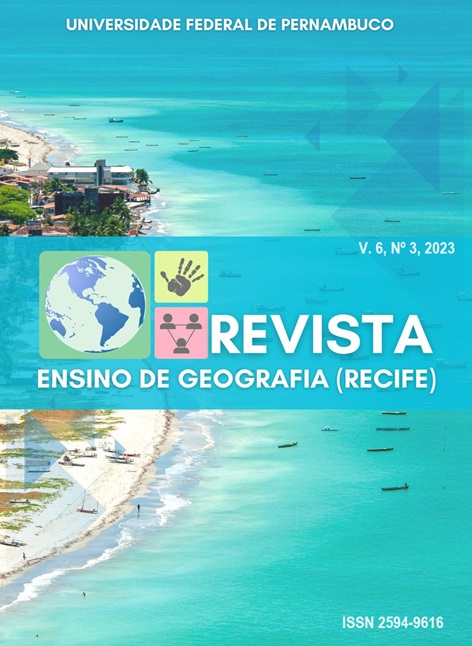School cartography and access to higher education: an analysis of how cartographic content is inserted in the entrance examinations of UNESP, UNICAMP, USP and ENEM
DOI:
https://doi.org/10.51359/2594-9616.2023.259622Keywords:
school cartography, access to higher education, entrance examAbstract
The theme of school cartography has been gaining more attention in geography studies, but there is limited discussion about the importance of cartographic language in university entrance exams. Cartographic language is crucial in basic education (elementary school and high school) as it has an interdisciplinary nature and can be used as a teaching tool in various fields of knowledge. This significance is evident in official documents that regulate Brazilian education, such as the National Common Curricular Base (BNCC), which emphasizes the role of cartography as a teaching methodology, particularly in geography. Given its significance in basic education, it is expected that this importance would be reflected in university entrance exams. Therefore, this article aims to address this gap in the field of Brazilian School Cartography by analyzing the entrance exams of three universities in São Paulo State (UNESP, UNICAMP, and USP) and the National High School Examination (ENEM) from the past five editions (2018, 2019, 2020, 2021, 2022). The analysis aims to highlight the frequency of cartography in these exams and the areas of knowledge that utilize it the most, emphasizing its interdisciplinary nature.
References
ALMEIDA, R. D. de. Do desenho ao mapa: iniciação cartográfica na escolar. São Paulo: Contexto, 2006.
ARCHELA, R. S.; THÉRY, H. Orientação metodológica para construção e leitura de mapas temáticos. Confins, n. 3, 2008.
BARBOSA, R. P. A questão do método cartográfico. Revista Brasileira de Geografia, Rio de Janeiro, v. 29, n. 4, p. 117-123, out./dez.1967.
BRASIL – MEC – MINISTÉRIO DA EDUCAÇÃO. Base Nacional Comum Curricular (BNCC). Brasília - DF: MEC, 2018.
CASTELLAR, S.; VILHENA, J. Ensino de Geografia. São Paulo: Cengage Learning, 2010. (Coleção Ideias em Ação)
CASTELLAR, S. A Cartografia e a construção do conhecimento em contexto escolar. In: ALMEIDA, Rosângela Doin de. (Org.). Novos Rumos da Cartografia Escolar: Currículo, linguagens e tecnologia. 1 ed. São Paulo: Contexto, 2011. pp. 121-135.
FAVARÃO, C. F. de M.; ARCHELA, R. S. Ensaio Metodológico de Cartografia no Ensino Fundamental. Geografia (Londrina), [S. l.], v. 20, n. 3, p. 025–034, 2011. DOI: 10.5433/2447-1747.2011v20n3p025. Disponível em: https://ojs.uel.br/revistas/uel/index.php/geografia/article/view/10485. Acesso em: 21 ago. 2023.
FRANCISCHETT, M. N. A Cartografia no ensino da geografia: A aprendizagem mediada. Cascavel: Edunioeste, 2004.
FRANCISCHETT, M. N. A Cartografia no ensino da geografia: Construindo os caminhos do cotidiano. Francisco Beltrao: [s.n], 1997.
GIRARDI, E. P. Proposição teórico-metodológica de uma cartografia geográfica crítica e sua aplicação no desenvolvimento do atlas da questão agrária brasileira. Presidente Prudente: [s.n.], 2008.
IBGE – INSTITUTO BRASILEIRO DE GEOGRAFIA E ESTATÍSTICA. Noções básicas de Cartografia. Rio de Janeiro: IBGE, 1999.
MARTINELLI, Marcello. Mapas da geografia e cartografia temática. 6. ed. São Paulo: Contexto, 2021.
SIMIELLI, M. E. R. Cartografia no Ensino Fundamental e Médio. In: CARLOS, A.F. (Org.). A geografia na sala de aula. 9 ed. São Paulo: Contexto, 2013, v. 1.
SOUZA, J. G.; KATUTA, A. M. Geografia e conhecimentos cartográficos: a Cartografia no movimento de renovação da Geografia brasileira e a importância do uso de mapas. São Paulo: Editora UNESP, 2001.
Downloads
Published
How to Cite
Issue
Section
License
Copyright (c) 2024 Paulo Roberto Alves de Araújo Junior

This work is licensed under a Creative Commons Attribution 4.0 International License.
Authors who publish with this journal agree to the following terms:- Authors retain copyright and grant the REVISTA ENSINO DE GEOGRAFIA (RECIFE) right of first publication with the work simultaneously licensed under a Creative Commons Attribution NonCommercial International 4.0 (CC BY-NC) that allows others to share the work with an acknowledgement of the work's authorship and initial publication in this journal.
- Authors are able to enter into separate, additional contractual arrangements for the non-exclusive distribution of the journal's published version of the work (e.g., post it to an institutional repository or publish it in a book), with an acknowledgement of its initial publication in this journal.
- Authors are permitted and encouraged to post their work online (e.g., in institutional repositories or on their website) prior to and during the submission process, as it can lead to productive exchanges, as well as earlier and greater citation of published work.



